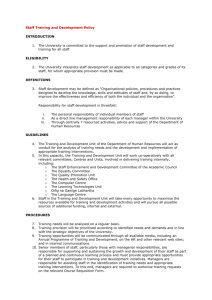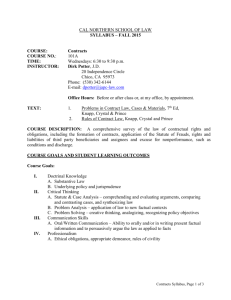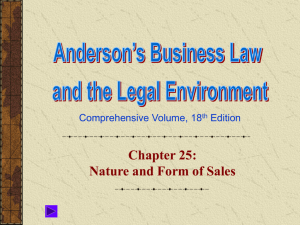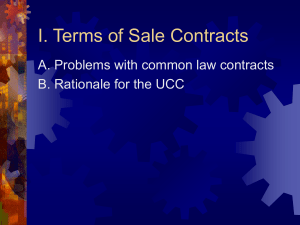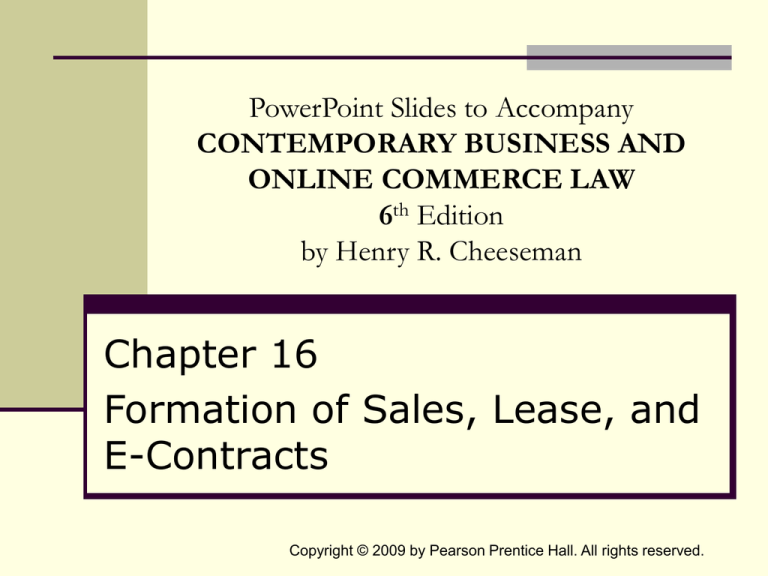
PowerPoint Slides to Accompany
CONTEMPORARY BUSINESS AND
ONLINE COMMERCE LAW
6th Edition
by Henry R. Cheeseman
Chapter 16
Formation of Sales, Lease, and
E-Contracts
Copyright © 2009 by Pearson Prentice Hall. All rights reserved.
Uniform Commercial Code (UCC)
Comprehensive statutory scheme
Serves as a model act
The UCC includes laws that cover most
aspects of commercial transactions
Every state (except Louisiana) has
enacted the UCC as their commercial law
statute
Copyright © 2009 by Pearson Prentice Hall. All rights reserved.
16 - 2
Overview of the Uniform
Commercial Code (UCC) (1 of 2)
Article 1
Article 2 (revised)
General provisions
Sales
Article 2A
Leases
Article 3
Negotiable instruments
Article 4
Bank deposits & collections
Article 4A
Wire transfers
Article 5
Letter of Credit
Copyright © 2009 by Pearson Prentice Hall. All rights reserved.
16 - 3
Overview of the Uniform
Commercial Code (UCC) (2 of 2)
Article 6
Article 7
Bulk transfers
Documents of title
Article 8
Investment securities
Article 9 (revised) Secured transactions
Copyright © 2009 by Pearson Prentice Hall. All rights reserved.
16 - 4
Scope of Article 2 (Sales)
All states except Louisiana have adopted
some version of Article 2 (Sales) of the
UCC
Article 2 is also applied by federal courts
to sales contracts governed by federal law
Article 2 establishes rules that govern the
sale of goods
Article 2 has recently been revised
Has been adopted by some states
Copyright © 2009 by Pearson Prentice Hall. All rights reserved.
16 - 5
What is a Sale?
A sale is the passing of title from a seller to a
buyer for a price [UCC 2-106(1)]
Big Cheese
Corporation
Sale of computer
Dell Computer
Corporation
(purchaser)
(seller)
Payment
Copyright © 2009 by Pearson Prentice Hall. All rights reserved.
16 - 6
What Are Goods?
Goods are defined as tangible things that are
movable at the time of their identification to
the contract [UCC 2-105(1)]
Money and intangible items such as stocks,
bonds, and patents are not tangible goods
Real estate is not a tangible good because it
is not movable
Contracts for provision of services are not
covered by Article 2
Copyright © 2009 by Pearson Prentice Hall. All rights reserved.
16 - 7
Who is a Merchant?
A person who:
1. Deals in the goods of the kind involved in
the transaction, or
2. By his or her occupation holds himself or
herself out as having knowledge or skill
peculiar to the goods involved in the
transaction.
[UCC 2-104(1)]
Copyright © 2009 by Pearson Prentice Hall. All rights reserved.
16 - 8
Scope of Article 2A (Leases)
Article 2A applies only to leases involving
goods
Article 2A does not apply to real estate or
other leases
Many states have adopted Article 2A
Copyright © 2009 by Pearson Prentice Hall. All rights reserved.
16 - 9
Definition of a Lease
Lease – a transfer of the right to the possession and use of the
named goods for a set term in return for certain consideration [UCC
2A-103(1)(i)(x)]
Lessor – the person who transfers the right of possession and use
of goods under the lease.
Lessee – the person who acquires the right to possession and use
of goods under a lease.
Dow Chemical
Company
Lease
(lessee)
Ingersoll-Rand
Corporation
(lessor)
Equipment
Copyright © 2009 by Pearson Prentice Hall. All rights reserved.
16 - 10
Finance Lease
A three-party transaction consisting of the
lessor, the lessee, and the supplier
The lessor does not select, manufacture,
or supply the goods
Instead, the lessor acquires title to the
goods or the right to their possession and
use in connection with the terms of the
lease [UCC 2A-103(1)(g)]
Copyright © 2009 by Pearson Prentice Hall. All rights reserved.
16 - 11
Example of a Finance
Lease Transaction
City Bank
(purchaser)
Sale of airplane
(lessor)
Lease
Payment
Lease
payments
Boeing Aircraft
Company
(seller)
Delivery of
airplane
Jet Blue
Airline Co.
(lessee)
Copyright © 2009 by Pearson Prentice Hall. All rights reserved.
16 - 12
Formation of Sales and
Lease Contracts (1 of 6)
Any rules established by Articles 2 and 2A
take precedence over the common law of
contracts
Offer
A contract for the sale or lease of goods may
be made in any manner sufficient to show
agreement
This includes conduct by both parties that
recognizes the existence of a contract [UCC
2-204(1), 2A-204(1)]
Copyright © 2009 by Pearson Prentice Hall. All rights reserved.
16 - 13
Formation of Sales and
Lease Contracts (2 of 6)
Open Terms
These open terms are
permitted to be read into a
Sometimes the parties to a
sales or lease contract
sales or lease contract
leave open a major term in This rule is commonly
the contract
referred to as the gapfilling rule [UCC 2-204(3),
Open Price Term
2A-204(3)]
Open Payment Term
Open Delivery Term
Open Time Term
Open Assortment Term
Copyright © 2009 by Pearson Prentice Hall. All rights reserved.
16 - 14
Formation of Sales and
Lease Contracts (3 of 6)
Firm Offer Rule [UCC 2-205, 2A-205]
A merchant who (1) offers to buy, sell, or
lease goods, and (2) gives a written and
signed assurance on a separate form that the
offer will be held open,
Cannot revoke the offer for the time stated or,
If no time is stated, for a reasonable time
Three months is the maximum amount of
time permitted under this rule
Copyright © 2009 by Pearson Prentice Hall. All rights reserved.
16 - 15
Formation of Sales and
Lease Contracts (4 of 6)
Acceptance
The UCC provides that a contract is created
when the offeree (i.e., the buyer or lessee)
sends an acceptance to the offeror, not when
the offeror receives the acceptance
The UCC permits acceptance by any
reasonable manner or method of
communication [UCC 2-206(1)(a), 2A-206(1)]
Copyright © 2009 by Pearson Prentice Hall. All rights reserved.
16 - 16
Formation of Sales and
Lease Contracts (5 of 6)
Accommodation Shipment
A shipment that is offered to the buyer as a
replacement for the original shipment when
the original shipment cannot be filled
The accommodation is a counteroffer from
the seller to the buyer
The buyer is free either to accept or to reject
the counteroffer [UCC 2-206(1)(b)]
Copyright © 2009 by Pearson Prentice Hall. All rights reserved.
16 - 17
Formation of Sales and
Lease Contracts (6 of 6)
Consideration
The formation of sales and lease contracts
requires consideration
Under the UCC, an agreement modifying a
sales or lease contract needs no
consideration to be binding [UCC 2-209(1),
2A-208(1)]
Modification of a sales or lease contract must
be made in good faith [UCC 1-203]
Copyright © 2009 by Pearson Prentice Hall. All rights reserved.
16 - 18
UCC Statute of Frauds
A rule that requires all contracts for the
sale of goods costing $500 or more, and
lease contracts involving payments of
$1,000 or more be in writing [UCC 2201(1), 2A-201(1)]
The writing must be sufficient to indicate
that a contract has been made between
the parties
Copyright © 2009 by Pearson Prentice Hall. All rights reserved.
16 - 19
Exceptions to the Statute
of Frauds
The following are exceptions to the
Writing Requirement of the UCC Statute
of Frauds:
Specially manufactured goods
Admissions in pleadings or court
Part acceptance
[UCC 2-201(3), UCC 2A-201(4)]
Copyright © 2009 by Pearson Prentice Hall. All rights reserved.
16 - 20
UCC Written Confirmation Rule
If both parties to an oral sales or lease contract
are merchants, the Statute of Frauds
requirements are satisfied if:
1. One of the parties sends a written confirmation of the
sale to the other within a reasonable time after
contracting, and
2. The other merchant does not give written notice of an
objection to the contract within ten days after
receiving the confirmation [UCC 2-201(2)]
Copyright © 2009 by Pearson Prentice Hall. All rights reserved.
16 - 21
When Written Modification
is Required
Oral modification is not enforceable if the
parties agree that any modification of the
sales or lease contract must be in a
signed writing. [UCC 2-209(2), 2A-208(2)]
In the absence of such an agreement, oral
modifications to sales and lease contracts
are binding if they do not violate the
Statute of Frauds.
Copyright © 2009 by Pearson Prentice Hall. All rights reserved.
16 - 22
Parol Evidence
A rule that states that when a sales or lease
contract is evidenced by a writing that is intended
to be a final expression of the parties’ agreement
or confirmatory memorandum, the terms of the
writing may not be contradicted by evidence of:
1. A prior oral or written agreement, or
2. A contemporaneous oral agreement (i.e., parol
evidence) [UCC 2-202, 2A-202]
Copyright © 2009 by Pearson Prentice Hall. All rights reserved.
16 - 23
Comparison of Contract Law and the
Law of Sales (1 of 3)
Topic
Common Law of
Contracts
UCC Law of Sales
Definiteness
Contract must contain
all of the material terms
of the parties’
agreement.
UCC gap-filling rules permit terms
to be implied if the parties
intended to make a contract.
[UCC 2-204]
Irrevocable
Offers
Option contracts.
Option contracts. Firm offers by
merchants to keep an offer open
are binding up to three months
without any consideration. [UCC
2-205]
Copyright © 2009 by Pearson Prentice Hall. All rights reserved.
16 - 24
Comparison of Contract Law and the
Law of Sales (2 of 3)
Topic
Common Law of
Contracts
UCC Law of Sales
Counteroffers
Acceptance must be a
mirror image of the
offer. A counteroffer
rejects and terminates
the offer.
Additional terms of an acceptance
become part of the contract if (1)
they do not materially alter the
terms of the offer and (2) the
offeror does not object within a
reasonable time after reviewing
the acceptance. [UCC 2-207]
Modification
Consideration is
required.
Consideration is not required.
[UCC 2-209]
Copyright © 2009 by Pearson Prentice Hall. All rights reserved.
16 - 25
Comparison of Contract Law and the
Law of Sales (3 of 3)
Topic
Common Law of
Contracts
UCC Law of Sales
Statute of
Frauds
Writing must be signed
by the party against
whom enforcement is
sought.
Writing may be enforced against a
party who has not signed it if (1)
both parties are merchants, (2)
one party sends a written
confirmation of their oral
agreement within a reasonable
time after contracting, and (3) the
other party does not give written
notice of objection within ten days
after receiving the confirmation.
[UCC 2-201]
Copyright © 2009 by Pearson Prentice Hall. All rights reserved.
16 - 26
Use of Letters of Credit in
International Trade
The irrevocable letter of credit has been
developed to manage the risks in
international sales.
The function of a letter of credit is to
substitute the credit of a recognized
international bank for that of the buyer.
Copyright © 2009 by Pearson Prentice Hall. All rights reserved.
16 - 27


